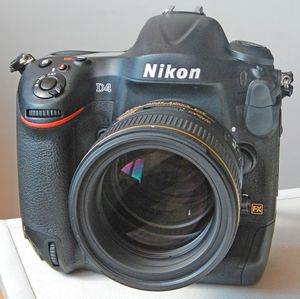Nikon D4
 |
| Type |
Digital single-lens reflex camera |
| Sensor |
36.0 mm × 23.9 mm CMOS, Nikon FX format, 7.3µm pixel size |
| Maximum resolution |
16.4 effective megapixels (4928 × 3280 pixels) |
| Lens |
Interchangeable, Nikon F-mount |
| Flash |
none built-in |
| Shutter |
Electronically controlled vertical-travel focal-plane shutter |
| Shutter speed range |
30 to 1/8000 second and bulb |
| ASA/ISO range |
ISO equivalency 100 to 12,800 in 1/3, 1/2 or 1.0 EV steps, Boost: 50–204,800 in 1/3, 1/2 or 1.0 EV steps |
| Exposure metering |
TTL exposure metering using 91,000-pixel RGB sensor |
| Exposure modes |
Programmed Auto [P], Shutter-Priority Auto [S], Aperture-Priority Auto [A], Manual [M] |
| Metering modes |
Center-weighted: Weight of 75% given to 12mm circle in center of frame; Matrix: 3D color matrix metering III (type G and D lenses); color matrix metering III (other CPU lenses) ;Spot: Meters 4 mm circle (about 1.5% of frame) centered on selected focus point |
| Focus areas |
51-area Nikon Advanced Multi-CAM 3500FX |
| Focus modes |
Auto AF-S/AF-C selection (AF-A), Continuous-servo (AF-C), Face-Priority AF available in Live View only and D-Movie only, Full-time Servo (AF-A) available in Live View only, Manual (M) with electronic rangefinder, Normal area, Single-servo AF (AF-S), Wide area |
| Continuous shooting |
10 frame/s (11 frame/s with AE/AF lock on first frame) |
| Viewfinder |
Optical-type fixed eye level pentaprism |
| Flash bracketing |
2-9 frames in steps of 1/3, 1/2, 2/3 or 1 EV |
| Focus bracketing |
none |
| Custom WB |
Auto, Presets (5), Manual, and Color temperature in Kelvin |
| WB bracketing |
2 to 9 exposures in increments of 1, 2 or 3 EV |
| Rear LCD monitor |
3.2-inch diagonal, (921,000 dots), TFT VGA |
| Storage |
One CompactFlash (Type I) card slots, one XQD card slot |
| Battery |
Li-ion EN-EL18 |
| Optional battery packs |
EH-6B AC Adapter |
| Weight |
1,180 g (2.60 lb) |
| Made in |
Japan |
The Nikon D4 is a 16.2-megapixel professional-grade full frame (35mm) digital single-lens reflex camera (DSLR) announced by Nikon Corporation on 6 January 2012.[1] It succeeds the Nikon D3S and introduces a number of improvements including a 16.2 megapixel sensor, improved auto-focus and metering sensors and the ability to shoot at an extended ISO speed of 204,800.[2] The camera was released in February 2012 at a recommended retail price of $5999.95.[2] It is the first camera to use the new XQD memory cards.
The Nikon D4 is aimed at sports and action photographers and photojournalists. With a continuous shooting rate of 10fps, a 20-second burst would yield 200 full-resolution images with full metering and autofocus for each frame. If exposure and focus are locked, the shooting rate can be increased to 11fps.
Features
- 16.4 effective megapixel Full-Frame (36 mm × 24 mm) sensor with ISO 100–12800 (ISO 50–204800 Boost)
- Nikon Expeed 3 image/video processor
- 91,000 pixel RGB metering sensor with Advanced Scene Recognition System
- Advanced Multi-CAM3500FX auto-focus sensor (51-point, 15 cross-type)
- 0.12 s start up time and 0.042 s shutter release delay.
- Image sensor cleaning
- Ten frames per second in continuous FX mode (eleven frames per second with auto-exposure and auto-focus disabled)
- Buffer for 100 RAW or 200 JPEG frames in one burst
- Built-in HDR and time lapse modes
- Built-in 10/100 base-T Ethernet port for data transfers and tethered shooting.
- 1080p Full HD movie mode at 24 fps worldwide and 25 or 30 depending on region, 720p at 25/50 or 30/60 fps, HDMI HD video out with support of uncompressed video output, stereo monitor headphone out, and stereo input (3.5-mm diameter) with manual sound level control.
- Kevlar/carbon fibre composite shutter with a rating of 400,000 actuations
- Live View with either phase detect or improved contrast detect Auto Focus
- Virtual horizon indicates in Live View mode, also available during video capture
- 'Active D-Lighting' with 6 settings and bracketing (adjusts metering and D-Lighting curve)
- Dual card slots, one CompactFlash UDMA and one XQD card slot (mirror, overflow, back-up, RAW on 1/JPEG on 2, Stills on 1/Movies on 2, copy)
- Fully weather sealed with O-rings
- GPS interface for direct geotagging supported by Nikon GP-1
Reception
The D4 achieved the fourth-best result in the DXOmark sensor rating, only beaten by two versions of the Nikon D800 and a medium format, 80-megapixel camera (Phase One IQ180).[3]
References
- ↑ Lua error in package.lua at line 80: module 'strict' not found.
- ↑ 2.0 2.1 Lua error in package.lua at line 80: module 'strict' not found.
- ↑ DXOmark Sensor ratings (needs Flash)
External links